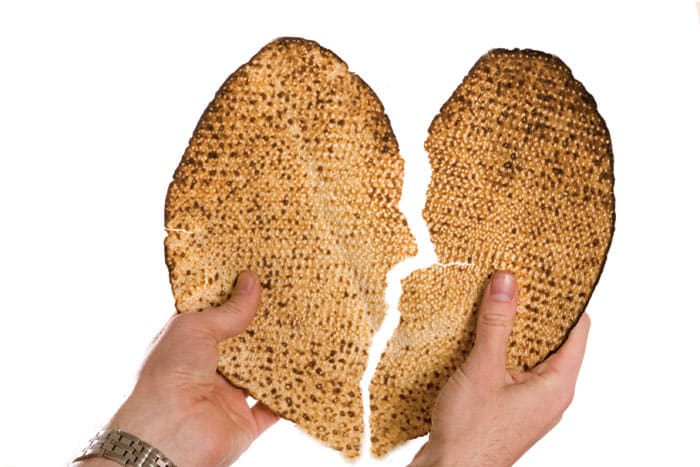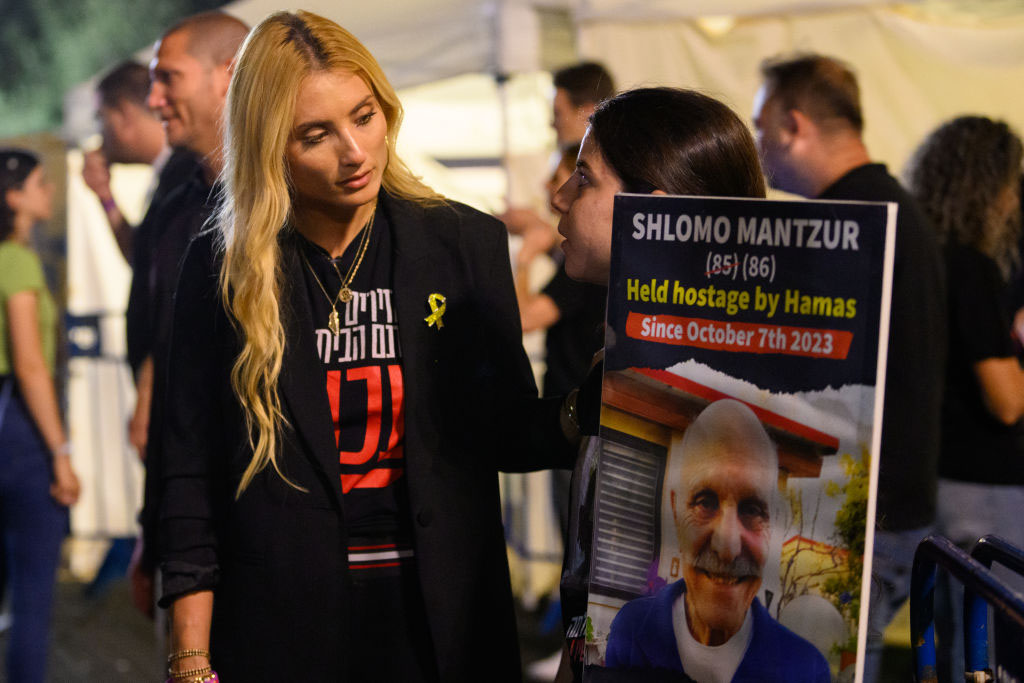
The following is a work of satire. Anyone who is aggrieved by this column is encouraged to contact the author’s attorneys, or better yet, to look the other way in the spirit of the Passover holiday.
The holidays can be a stressful time for Jewish families, but for one local couple, a disturbing revelation during Passover resulted in all-out divorce proceedings. Hamid Hamadanian, a Tarzana resident and Iranian American Jew, was horrified to recently learn that his wife had only married him so that she could enjoy rice and kitniyot (legumes) during Passover. Hamadanian had been married to his wife, who is Ashkenazi, for six months, when the young woman accidentally spilled the beans (no pun intended) that she was “sick and tired of matzah brei,” adding, “Matzah brei isn’t a side dish. Horseradish isn’t a side dish. I married a Persian man because I deserve rice and beans, don’t I?” In an exclusive interview, Hamadanian told the Journal, “I’m appalled that my wife married me for such painfully shallow reasons. You’re supposed to marry a man because he’s a good person, treats you well and his earning potential increases by 8% each year.” The couple is due in court in May. Hamadanian’s wife, Essie, declined an interview with the Journal, but later emailed this author to ask, “Do Moroccans get to eat rice and kitniyot during Pesach?”
While the aforementioned incident concerns a husband seeking divorce from his wife, in the case of one Pico-Robertson couple, a wife has served her husband with divorce papers, alleging that he’s “gone overboard” with Passover cleaning and that she can’t “take it anymore.” In an interview, Chaya R. told the Journal, “Each year, it seems to get worse. He [her husband] pulled down the nine-foot drapes and washed them in the Los Angeles River. Normally, I’d be disgusted. I mean, have you seen that ‘river’? But thankfully, all the recent rainfall made the river really lush, lovely and clean. But I digress. And he tore open our down comforter. There were feathers all over the bed. Then, he used a feather he’d bought at a Judaica shop and a candle to search the contents of our down comforter for chametz. I asked him, ‘Why didn’t you just pull a feather from the comforter itself?!’ But again, I digress.” When asked if there was a final straw to her husband’s obsessive cleaning, Chaya added, “I knew things had gone way too far when I woke up in the middle of the night last week and found him going through my eyebrows with a tiny comb, looking for bread crumbs.” Court proceedings have been scheduled for early June.
MEH (Mediocre Express Holidays), a travel company that specializes in budget-friendly Passover programs (as opposed to those that charge between $10,000 and $25,000 for fancier programs in exotic destinations), has announced a record number of participants for this year’s Passover excursions. The programs include lodging, all meals (including seders), childcare and entertainment. Travelers will enjoy a relaxed, luxurious 10-day program, with destination choices including “exciting Slab City, decadent Carpinteria or bountiful Bakersfield,” according to MEH’s website.
Crummy Dining, a catering service that mostly accommodates elderly Jews, recently hosted a “Pre-Pesach Seder” at a local Jewish seniors’ center. Tradition calls for the youngest person at the table to search for the afikomen, and in this case, Saul Blau, a spry 86-year-old, found the afikomen in no time, hidden inside a newspaper. “I don’t suppose you know what this is,” Blau said to this reporter as he pointed to the newspaper, “but this is why we can sit still for hours, while the younger folks have the attention span of a gnat.” In other news, Crummy Dining has informed the Journal of a future name change. “It was always supposed to be ‘Crumby Dining,” said a spokesperson, “but our intern who handles the legal paperwork grew up with autocorrect and doesn’t bother to spell-check anything himself.”
Meanwhile, at a seder in Venice Beach, Anheuser B. Hoffman (the B is for Busch), the oldest son in the Hoffman family, cleverly hid the afikomen in his father’s night stand. When his youngest brother, Michelob, found the afikomen after a thorough search of the house, he squealed with glee and ran into the dining room to announce the news to his family and their guests. Little Michelob, who is five, held up the afikomen, along with a clear Ziploc bag containing a butane lighter and what resembled small balls of herbs, and declared, “I found the afikomen, and I also found some dry maror (bitter herbs) from last year!” His father, Bud, immediately jumped across the table to retrieve his pungent herbs. As his wife chastised him in the kitchen, Bud could be heard mumbling, “I should have signed us up for a MEH Pesach program in Torrance.”
Meanwhile, during the same seder, the family’s great-uncle Morteza began choking on a large piece of meat in the Persian stew, but no one bothered to call the paramedics.
Across the country in Great Neck, NY, a 12-year-old was rushed to the hospital in what doctors described as “Dayenu gone wrong.” Jaydenette, the daughter of an Iranian American Jewish couple, survived an injury in her left eye when a cousin ambushed her with a particularly large scallion, per the Persian Jewish custom of batting one another with the allium during the Dayenu recitation of the seder. Jaydenette endured several hours of discomfort, but was eventually discharged from the hospital. Meanwhile, during the same seder, the family’s great-uncle Morteza, began choking on a large piece of meat in the Persian stew, but no one bothered to call the paramedics. “Great Uncle Morteza had been getting on everyone’s nerves for years,” said a relative who asked to remain anonymous, “ever since he encouraged every family member to move all their money to Silicon Valley Bank [SVB].”
Finally, Egypt’s Foreign Ministry has announced a record number of applications in 2023 for immigration from the United States and Israel. Speaking on conditions of anonymity, a diplomat at an Egyptian Consulate in a major American city told the Journal, “For some reason, a bunch of American Jews don’t feel safe in the U.S. anymore and think Egypt would be better.” He added, “And we’ve hired a sophisticated data analyst team to help us assess why we’ve received over 300,000 applications for immigration from Israelis.” According to the official, Israelis flooded the Egyptian embassy with visa requests the day after Israeli leaders passed recent (controversial) judicial reforms that have sent hundreds of thousands of protesters to the streets. “We believe they’re drawn to Egypt’s pleasant weather and history of positive Jewish relations, dating back to the time of the plagues,” said the official. The Egyptian Foreign Ministry has launched a campaign to encourage even more American, Israeli (and French, British, Canadian, Mexican, Latin American, Eastern European, Middle Eastern, and Jews pretty much everywhere) to immigrate to Egypt, with colorful brochures and digital ads that promise, “Next year in Cairo.”
Tabby Refael is an award-winning weekly columnist for The Jewish Journal, and an LA-based speaker and civic action activist. Follow her on Twitter and Instagram @TabbyRefael.






















 More news and opinions than at a Shabbat dinner, right in your inbox.
More news and opinions than at a Shabbat dinner, right in your inbox.